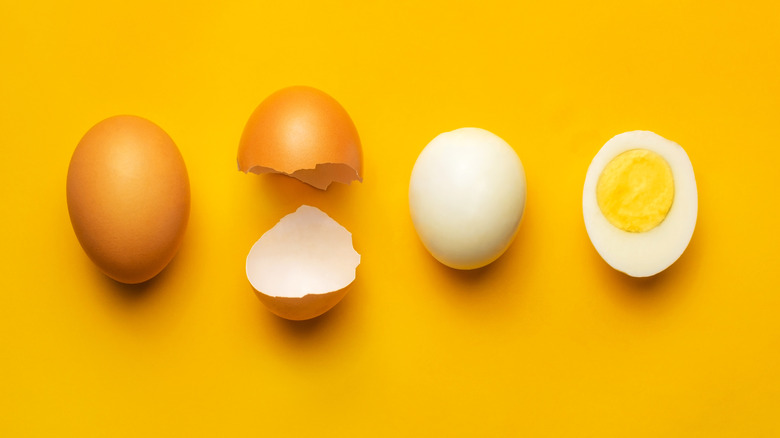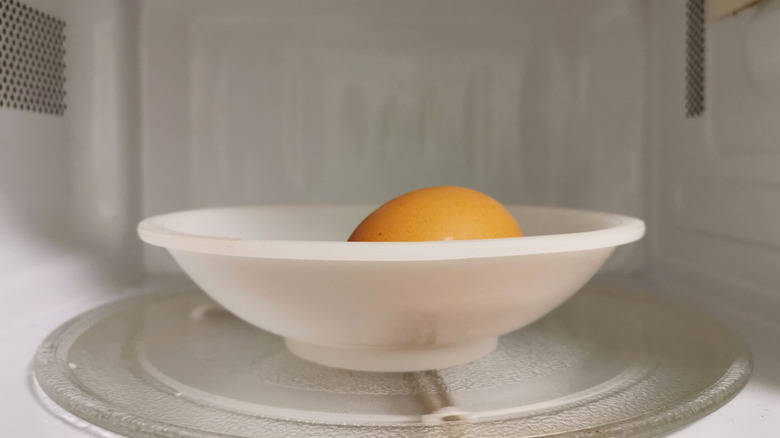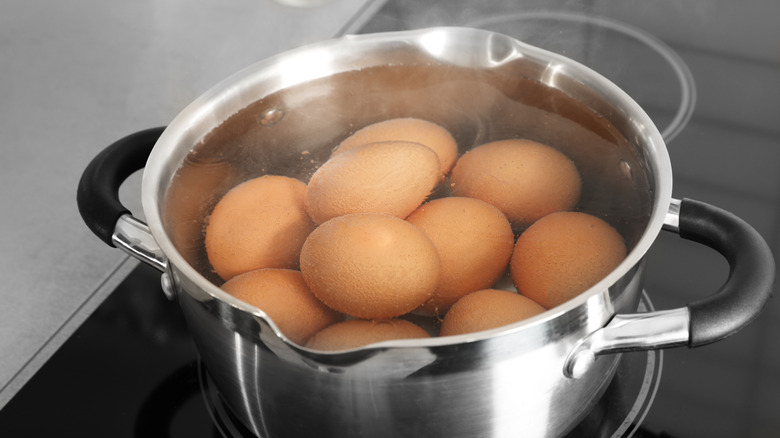The Absolute Best Ways To Reheat Boiled Eggs
We've all been there: You whip up your favorite tuna salad recipe and end up with a few leftover hard-boiled eggs. All good intentions aside, those boiled eggs sit in the refrigerator for days until you finally find yourself Google searching, "how long are hard-boiled eggs good for?" That's right; before you know it, you've forgotten about those leftover eggs, and it's time to toss them.
According to the FDA, eggs should be stored in a refrigerator in their original carton and used within three weeks. Hard-boiled eggs should be consumed within one week after cooking, and frozen eggs within one year, and they shouldn't be frozen in their shells.
Suppose you haven't forgotten about those boiled eggs and want to reheat them. Is it safe? If you choose to reheat boiled eggs, what is the best method? We've gathered some effective ways to do this without losing the integrity or flavor of the egg.
Can you microwave hard-boiled eggs?
Hazard alert! My Recipes says that reheating hard-boiled eggs in the microwave is a potential safety setback. Why? Microwaves are uber-convenient for heating foods and beverages in only a few seconds, so what could possibly go wrong? My Recipes says that hard-boiled eggs explode in the microwave due to the moisture trapped inside the egg yolk. In turn, the egg's shell prevents the egg from expanding when it heats up, which causes the unsightly explosion.
My Recipes goes on to say that this egg-plosion can be compared to a well-shaken can of soda. What happens when a soda can has been tossed around a few times, then opened? The pressure inside can cause a fizzy soda eruption when the seal is broken. The same is true for the pressure built inside the egg. Pantry and Larder say that if you must use a microwave, then peel and slice or cut the eggs in half before covering with a paper towel and reheating. This method may still cause the same disastrous result, so use caution. Pantry and Larder also says to never reheat hard-boiled eggs whole or unpeeled in the microwave.
To prevent a messy mishap, forgo the microwave altogether. There's a cleaner way to reheat hard-boiled eggs.
Reheat hard-boiled eggs in hot water
This less-messy way to reheat eggs will provide you with warm eggs and zero explosions. My Recipes recommend placing your hard-boiled eggs into a heat-proof bowl filled with boiling water. Ensure that the eggs are completely submerged in the water, then cover the bowl to trap the heat. Allow the eggs to rest in the hot water for about ten minutes, then remove, cool, crack, and peel the eggs.
Pantry and Larder also agree with the hot water method for reheating hard-boiled eggs. Their process is slightly different, though. They recommend bringing water to just below boiling point, then removing it from the heat. Submerge the hard-boiled eggs in the water, cover them with a lid, and allow the eggs to warm for four to five minutes. Finally, remove the eggs and serve. Pantry and Larder say this method is low-risk and effective and leaves the egg whites warm, and avoids the yolk from being overcooked.
Reheat hard-boiled eggs in a steamer
Another suitable method for reheating multiple hard-boiled eggs is steaming them, according to Pantry and Larder. They say that this method works well, but involves a lot of unnecessary effort because the hot water works just as well. If you don't have a steamer, use a traditional pot, colander, and lid for this reheating method.
Boil water in the lower compartment of the steamer (or the pot if you're using one). Place the eggs inside the steamer basket or pot, and cover with a lid. Allow the eggs to warm for two to three minutes, flipping them halfway during heating. Carefully remove the — hot! — eggs, peel, and serve.
Taste of Home lists various recipes that include hard-boiled eggs such as tuna or egg salad for sandwiches. Boiled eggs also taste great diced in almond chicken salad or macaroni salad. If you have leftover hard-boiled eggs, heed the FDA's advice and eat them within one week of cooking.



